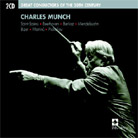May 2003
This Munch set is one of the best. The conductor was best known to American audiences as music director of the Boston Symphony from 1949-62. A Munch concert was liable to be a volatile affair. The conductor would often become suddenly inspired and take off on a tangent not covered in rehearsal. This kept the musicians on their toes and the music making spontaneous and fresh. Munch was better behaved in the recording studio, but the performances chosen for this two-CD set preserve his impetuous, spirited nature. The first disc opens with a sparkling performance of the relatively unfamiliar Princess jeune Overture, recorded in 1951 with the Boston Symphony. It continues with what I feel is one of the best Beethoven 9th Symphonies ever taped, a Boston Symphony recording in stereo from 1958. The conductor brings palatable tension to the first movement, unbridled energy to the second, and heroic lyricism to the third. The last movement features one of the finest vocal quartets ever assembled to record the work. Thanks to Munch’s inspired leadership, this movement caps the composition as a real "Ode to Joy." The second disc contains the only questionable choice of the set: a 1966 Concert Hall recording of Bizet’s Symphony in C that first appeared in the US on Nonesuch LP. Though it is still a better reading than given by many another famous conductor, Munch himself had done the piece better in a 1963 recording with the Royal Philharmonic for Readers Digest. That recording is now available on Chesky CD, coupled with a Tchaikovsky Francesca da Rimini that is so hot it almost smokes. But back to EMI, disc two continues with two gems from the very early days of stereo: Boston Symphony recordings of Martinu’s Fantasies symphoniques, premiered by Munch, and excerpts from a recording of Suites 1 and 2 from Prokofiev’s ballet, Romeo & Juliet. In the latter, "The Death of Tybalt," sizzles in typical Munch fashion. The recorded sound is generally good throughout, making allowances for the many different sources. The Beethoven 9th released here for the first time on CD, is especially excellent. The dynamic range is adequate, the frequency range wide. The bass line is focused, rich, and impressive, while the chorus and soloists are properly balanced in the finale. On the debit side, the upper strings and woodwind sound a bit strident at times, though often this effect merely adds to the excitement. For two-and-a-half hours of dynamic music making, this set is hard to beat. Moreover, it is one of the few recordings of the Saint-SaŽns and Martinu works. Overall, this Great Conductors installment presents very good value for dollar. GO BACK TO: |
 Great
Conductors of the 20th Century: Charles Munch
Great
Conductors of the 20th Century: Charles Munch![[Reviewed on CD]](../format/regcd.gif) The Great
Conductors series has been a gigantic undertaking. Carte blanche was given to
license recordings from all studios, so one is likely to find recordings from RCA, Decca,
and others under the EMI banner. Many live broadcasts are included, and each set contains
a booklet filled with facts, observations, and photos. The series has been an up-and-down
affair. Some of the sets, such as one devoted to Pierre Monteux, have been quite good.
Others, like the Ferenc Fricsay volume, present ill-chosen radio broadcast material, while
excellent studio masters are curiously ignored.
The Great
Conductors series has been a gigantic undertaking. Carte blanche was given to
license recordings from all studios, so one is likely to find recordings from RCA, Decca,
and others under the EMI banner. Many live broadcasts are included, and each set contains
a booklet filled with facts, observations, and photos. The series has been an up-and-down
affair. Some of the sets, such as one devoted to Pierre Monteux, have been quite good.
Others, like the Ferenc Fricsay volume, present ill-chosen radio broadcast material, while
excellent studio masters are curiously ignored.